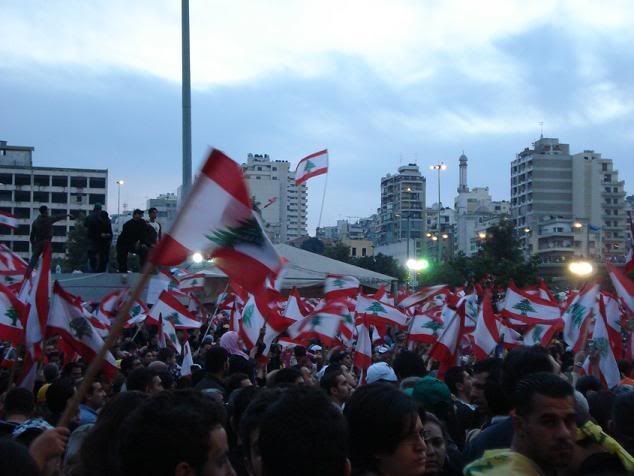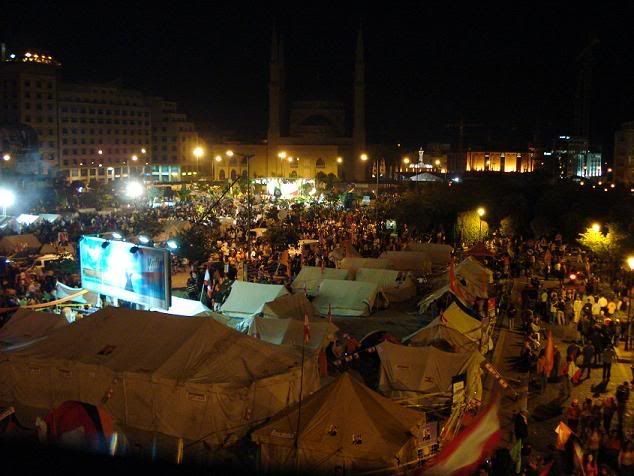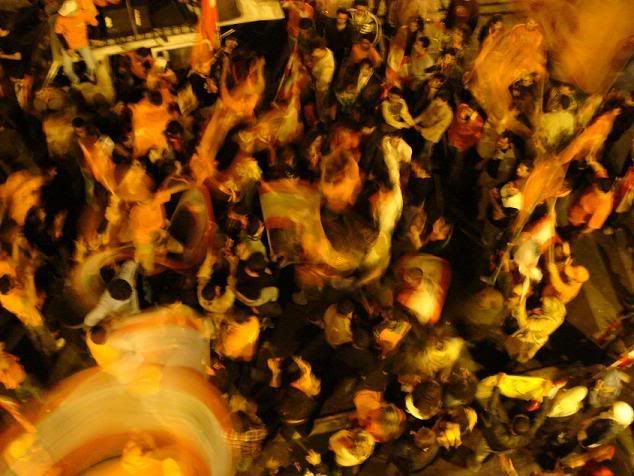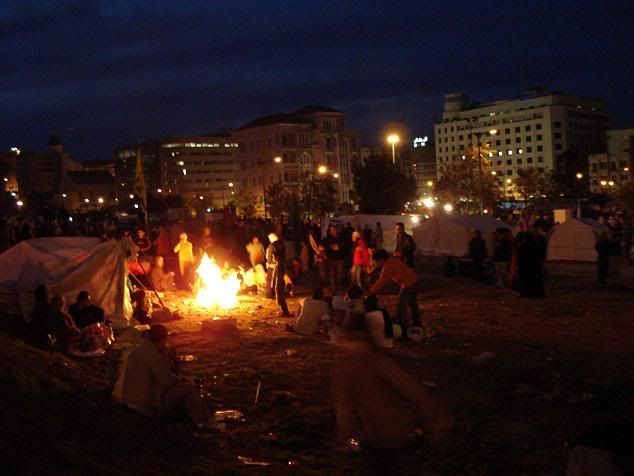I just got off the phone with my father in the US. He immediately started giving me a lecture on Lebanese politics, if you can call it that. Generally speaking, I can count on my father to represent the red-state everyman, whether the topic is foreign policy or domestic affairs. He's worried about me being in Beirut, which is normal, especially since the Arab world is a region that seems very foreign and even threating to him.
He brought up the protests and how the situation was getting dangerous in Lebanon. I told him that I had actually just come back from them and that the mood was festive, nonviolent and, ultimately, democratic. He told me that no, Hezbollah was just a bunch of terrorists and that they aren't democratic and that they're trying to take over the country.
Things always start deteriorating when I can't hold my tongue in these situations. I told him that if he was interested in knowing the specifics of the situation, I could explain them to him, but I was not interested in getting a lecture on Lebanese politics from someone who doesn't know anything about the subject.
However, as a representative of the American mindset, one of his sentences stuck in my mind: "Everyone knows the Hezbollah terrorists are trying to take over the government." Speaking from an American view point, he's probably right. Everyone knows what's happening. Of course they don't actually know what's going on here, but that doesn't make their certainty any less headstrong.
I went down to the protests again today. If you hadn't been following the situation here and didn't speak any Arabic, you might think that everyone had showed up in Beirut for a music festival, or maybe an independence day celebration or some other national holiday.
Downtown has turned into a souk, with people hawking political flags and shirts out of the trunk of their cars or on tables set up in the newly formed tent village. Vendors sell warm food, cigarettes and cold drinks. Shia clerics stand next to young women with abundant cleavage and bear shoulders. Supporters of Hezbollah and Amal mingle with Christian supporters of General Aoun and communists who hock Che scarves and Lebanese flags with a hammer and sickle on them.
Youth congregate together drawing into circles to dance and sing while drums are beaten loudly. Children have faces painted red, white and green to mirror the Lebanese flag, sometimes with a small flag on each cheek, other times with the a single taking up the entire face, the centered ceder formed by a small nose. The sound of two teacups click-clacking together calls those protesters who would like to sit down and warm up with a cup of hot tea. Barbecue grills are set up, some selling food while other sell hot coals for the myriad of water pipes everyone seems to be smoking between chanting slogans and waving flags. These are the "terrorists" my father was lecturing me about.
As dusk falls, some protesters gather into buses to make the trip back home while others start fires to keep themselves warm next to their tents. Downtown feels alive and vibrant, religiously and socially mixed -- somewhat like I imagine it being before the civil war and before it was revamped into an expensive simulacrum of its former self.

Protesters wave Lebanese flags downtown in hopes of pressuring PM Siniora to resign.

Downtown has turned into a festive tent city, with hundreds of thousands converging on the capital to show the government their discontent.

Opposition supporters come together to dance underneath the overpass, which houses many who are camping here until the government resigns or expands the opposition's representation in the cabinet.

Protesters get ready for the evening by lighting up camp fires.
1 comment:
It must be a fascinating atmosphere there. I imagine that people are talking politics, politics, politics. The idealism must be inspiring.
Although I largely disagree with your dad's biased assertions, I think it could be still worthwhile to think about how non-violent protests do not necessarily lead to non-violent outcomes. Social movements are unpredictable animals and we don't need to look so deep into World history to realize this. In a country in which social control appears flimsy at best, we'll see how things turn out. As usual, we're all at the mercy of some contingent historical events, such as some rotten apple who seeks to change history through the use of violence. As intended, we can only wait for history to unfold.
Thanks for the live info. It's worthwhile to think about the marginalization of certain ethnic and religious groups in Lebanon. As these protests have demonstrated, it's an inescapable reality that the current Lebanese government has not been fair.
Let's hope that the outcome will be fair.
-km
-km
Post a Comment